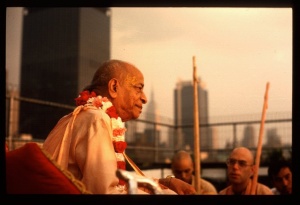SB 1.4.10: Difference between revisions
m (1 revision(s)) |
(Vanibot #0054 edit - transform synonyms into clickable links, which search similar occurrences) |
||
| (One intermediate revision by one other user not shown) | |||
| Line 1: | Line 1: | ||
{{info | {{info | ||
|speaker= | |speaker=Śaunaka Ṛṣi | ||
|listener= | |listener=Sūta Gosvāmī and the Sages | ||
}} | }} | ||
[[Category:Srimad-Bhagavatam - Canto 01 Chapter 04]] | |||
[[Category:Bhagavatam Verses Spoken by Saunaka Rsi - Vanisource|010410]] | |||
<div style="float:left">'''[[Srimad-Bhagavatam]] - [[SB 1|First Canto]] - [[SB 1.4: The Appearance of Sri Narada|Chapter 4: The Appearance of Śrī Nārada]]'''</div> | |||
<div style="float:right">[[File:Go-previous.png|link=SB 1.4.9]] '''[[SB 1.4.9]] - [[SB 1.4.11]]''' [[File:Go-next.png|link=SB 1.4.11]]</div> | |||
{{CompareVersions|SB|1.4.10|SB 1962|SB 1972-77}} | |||
{{RandomImage}} | |||
==== TEXT 10 ==== | ==== TEXT 10 ==== | ||
<div | <div class="verse"> | ||
sa samrāṭ kasya vā hetoḥ | :sa samrāṭ kasya vā hetoḥ | ||
pāṇḍūnāṁ māna-vardhanaḥ | :pāṇḍūnāṁ māna-vardhanaḥ | ||
prāyopaviṣṭo gaṅgāyām | :prāyopaviṣṭo gaṅgāyām | ||
anādṛtyādhirāṭ-śriyam | :anādṛtyādhirāṭ-śriyam | ||
</div> | </div> | ||
| Line 17: | Line 23: | ||
==== SYNONYMS ==== | ==== SYNONYMS ==== | ||
<div | <div class="synonyms"> | ||
''[//vanipedia.org/wiki/Special:VaniSearch?s=saḥ&tab=syno_o&ds=1 saḥ]'' — he; ''[//vanipedia.org/wiki/Special:VaniSearch?s=samrāṭ&tab=syno_o&ds=1 samrāṭ]'' — the Emperor; ''[//vanipedia.org/wiki/Special:VaniSearch?s=kasya&tab=syno_o&ds=1 kasya]'' — for what; ''[//vanipedia.org/wiki/Special:VaniSearch?s=vā&tab=syno_o&ds=1 vā]'' — or; ''[//vanipedia.org/wiki/Special:VaniSearch?s=hetoḥ&tab=syno_o&ds=1 hetoḥ]'' — reason; ''[//vanipedia.org/wiki/Special:VaniSearch?s=pāṇḍūnām&tab=syno_o&ds=1 pāṇḍūnām]'' — of the sons of Pāṇḍu; ''[//vanipedia.org/wiki/Special:VaniSearch?s=māna&tab=syno_o&ds=1 māna]-[//vanipedia.org/wiki/Special:VaniSearch?s=vardhanaḥ&tab=syno_o&ds=1 vardhanaḥ]'' — one who enriches the family; ''[//vanipedia.org/wiki/Special:VaniSearch?s=prāya&tab=syno_o&ds=1 prāya]-[//vanipedia.org/wiki/Special:VaniSearch?s=upaviṣṭaḥ&tab=syno_o&ds=1 upaviṣṭaḥ]'' — sitting and fasting; ''[//vanipedia.org/wiki/Special:VaniSearch?s=gaṅgāyām&tab=syno_o&ds=1 gaṅgāyām]'' — on the bank of the Ganges; ''[//vanipedia.org/wiki/Special:VaniSearch?s=anādṛtya&tab=syno_o&ds=1 anādṛtya]'' — neglecting; ''[//vanipedia.org/wiki/Special:VaniSearch?s=adhirāṭ&tab=syno_o&ds=1 adhirāṭ]'' — acquired kingdom; ''[//vanipedia.org/wiki/Special:VaniSearch?s=śriyam&tab=syno_o&ds=1 śriyam]'' — opulences. | |||
</div> | </div> | ||
| Line 24: | Line 30: | ||
==== TRANSLATION ==== | ==== TRANSLATION ==== | ||
<div | <div class="translation"> | ||
He was a great emperor and possessed all the opulences of his acquired kingdom. He was so exalted that he was increasing the prestige of the Pāṇḍu dynasty. Why did he give up everything to sit down on the bank of the Ganges and fast until death? | He was a great emperor and possessed all the opulences of his acquired kingdom. He was so exalted that he was increasing the prestige of the Pāṇḍu dynasty. Why did he give up everything to sit down on the bank of the Ganges and fast until death? | ||
</div> | </div> | ||
| Line 31: | Line 37: | ||
==== PURPORT ==== | ==== PURPORT ==== | ||
<div | <div class="purport"> | ||
Mahārāja Parīkṣit was the Emperor of the world and all the seas and oceans, and he did not have to take the trouble to acquire such a kingdom by his own effort. He inherited it from his grandfathers Mahārāja Yudhiṣṭhira and brothers. Besides that, he was doing well in the administration and was worthy of the good names of his forefathers. Consequently there was nothing undesirable in his opulence and administration. Then why should he give up all these favorable circumstances and sit down on the bank of the Ganges, fasting till death? This is astonishing, and therefore all were eager to know the cause. | Mahārāja Parīkṣit was the Emperor of the world and all the seas and oceans, and he did not have to take the trouble to acquire such a kingdom by his own effort. He inherited it from his grandfathers Mahārāja Yudhiṣṭhira and brothers. Besides that, he was doing well in the administration and was worthy of the good names of his forefathers. Consequently there was nothing undesirable in his opulence and administration. Then why should he give up all these favorable circumstances and sit down on the bank of the Ganges, fasting till death? This is astonishing, and therefore all were eager to know the cause. | ||
</div> | </div> | ||
__NOTOC__ | |||
<div style="float:right; clear:both;">[[File:Go-previous.png|link=SB 1.4.9]] '''[[SB 1.4.9]] - [[SB 1.4.11]]''' [[File:Go-next.png|link=SB 1.4.11]]</div> | |||
__NOTOC__ | |||
__NOEDITSECTION__ | |||
Latest revision as of 18:09, 17 February 2024

A.C. Bhaktivedanta Swami Prabhupada
TEXT 10
- sa samrāṭ kasya vā hetoḥ
- pāṇḍūnāṁ māna-vardhanaḥ
- prāyopaviṣṭo gaṅgāyām
- anādṛtyādhirāṭ-śriyam
SYNONYMS
saḥ — he; samrāṭ — the Emperor; kasya — for what; vā — or; hetoḥ — reason; pāṇḍūnām — of the sons of Pāṇḍu; māna-vardhanaḥ — one who enriches the family; prāya-upaviṣṭaḥ — sitting and fasting; gaṅgāyām — on the bank of the Ganges; anādṛtya — neglecting; adhirāṭ — acquired kingdom; śriyam — opulences.
TRANSLATION
He was a great emperor and possessed all the opulences of his acquired kingdom. He was so exalted that he was increasing the prestige of the Pāṇḍu dynasty. Why did he give up everything to sit down on the bank of the Ganges and fast until death?
PURPORT
Mahārāja Parīkṣit was the Emperor of the world and all the seas and oceans, and he did not have to take the trouble to acquire such a kingdom by his own effort. He inherited it from his grandfathers Mahārāja Yudhiṣṭhira and brothers. Besides that, he was doing well in the administration and was worthy of the good names of his forefathers. Consequently there was nothing undesirable in his opulence and administration. Then why should he give up all these favorable circumstances and sit down on the bank of the Ganges, fasting till death? This is astonishing, and therefore all were eager to know the cause.